There are so many enticing elements of horror that draw readers in and hold their attention. It's the dread-inducing suspense, chilling prose or maybe that creeping tension winding tighter and tighter. But nothing enthralls me more than the atmospheric feeling you get from reading quiet horror. Such a story is palpable and I crave it with every new book I pick up. This is something that I believe to be lost on a lot of readers of the macabre. Many are familiar with the gripping stories, but not so much the term or meaning of quiet horror. Below you are going to find many amazingly talented writers who I believe to be masters of such frightening tales. Here is what quiet horror means to those who wield its power to invoke menacing terror.
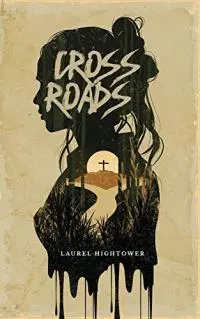 Laurel Hightower is best known for her novel Whispers in the Dark, a thrilling supernatural tale steeped in tension and suspense. She also recently graced the horror community with Crossroads, an emotionally gutting story about the lengths a mother would go to for her child.
Laurel Hightower is best known for her novel Whispers in the Dark, a thrilling supernatural tale steeped in tension and suspense. She also recently graced the horror community with Crossroads, an emotionally gutting story about the lengths a mother would go to for her child.
Laurel: It’s been interesting to hear Crossroads described as quiet horror, which is not a subgenre I was previously aware of. I don’t think a whole lot about genre when I write, but in mulling over the term, I can see why it’s something that appeals to me. Ghosts, as you may have noticed, are my favorite horror element, and I like to see how different writers and entertainment mediums handle them. When asked about my favorite horror story, or the one that got me started, I usually talk about Shirley Jackson’s The Haunting of Hill House. Reason being, that line: “Whose hand was I holding?”
Gah, it brings shudders just writing it out. It’s as effective a jump scare as any you’ll find in written form, but when I think about it, and why it’s so effective, it’s really the quiet parts around it that give it the oomph. If memory serves, around this time Theo and Eleanor are huddling together, riding out their fear of a ghostly manifestation. But it’s the smallness of it that makes the reader feel their vulnerability. They’re not standing there wielding fireplace pokers and screaming into the storm — they’re making themselves as small and quiet as they can to avoid the attention of the beast. And that, for me, is when horror is most effective.
Tying into that, it’s the emotion of the characters that carry the scares. Slashers and chomp-n-stomps absolutely have their place in the joyous realm of horror, but for me, being pulled down into the silence of an isolated, sometimes heartbroken character forces me to feel their vulnerability, which makes things that much worse when something comes for them. Be it a ghost, or a slinking vampire promising an escape into a painless life, or any one of a thousand horror elements both well-trodden and yet to be discovered, the calm before the storm is what intensifies the stakes, and the scares.
Get Crossroads at Bookshop or Amazon
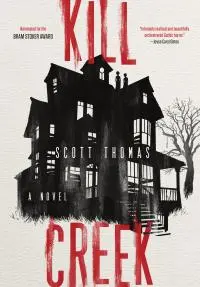 Scott Thomas is the author of Kill Creek and Violet, which are vehemently praised as horrifyingly eerie tales that have a way of inciting fear in those who embrace the pages within these books.
Scott Thomas is the author of Kill Creek and Violet, which are vehemently praised as horrifyingly eerie tales that have a way of inciting fear in those who embrace the pages within these books.
Scott: Ever since I was a little kid, I’ve loved creepy stories. Stories that get under your skin, that make your arms prickle with goosebumps, stories that feel like a cold hand on the back of your neck. Don’t get me wrong, I also love a mean, take-no-prisoners rollercoaster ride, but it’s the quiet ones, the ones that sneak up on you that really stick with me. You have a (very slim) chance of outrunning a maniac with an axe, but when there is something out there, some malevolent presence, creeping closer and closer, infecting your life with its evil, there’s no way to escape that. And that, to me, is truly terrifying.
Quiet horror tends to be more emotional, more character-driven, more internal, if only because, as a writer, you need other things to explore as the threat is creeping closer. It gives you time to really get to know the characters and their situations outside of the supernatural. That excites me as a writer and a reader. It allows for the creation of a true sense of place and character, an illusion of normality that can slowly, methodically fracture until it finally shatters. The tension and dread build up until it feels like they are seeping out of the pages of the book and into your life. The Turn of the Screw. The Haunting of Hill House. The House Next Door. House of Leaves. The Shining. The Other. These books terrified me when I read them and inspired me as I sat down to write my own stories.
As a father and a husband, there is nothing more terrifying than the thought of something worming its way into my everyday life and destroying it. Not a senseless act of violence but something hellbent on destroying me and the people I care about. Quiet horror is personal horror. Otherwise, it wouldn’t take the time it does to infiltrate our hearts and minds. It wants to destroy us, and it will take all the time it needs to accomplish its goal. Therefore every creak of a floorboard, every whistle of the wind, every groan of a door hinge becomes an alarm bell ringing. But the characters are rarely looking for those signs. They’re too caught up in their own lives to realize they are in danger until it is too late. There’s no escape. It has its hooks in you. That’s more than shock or terror. That is true horror.
Get Kill Creek at Bookshop or Amazon
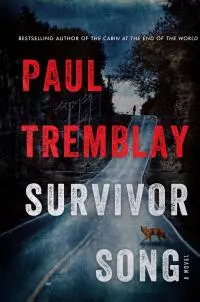 Paul Tremblay is the author of several devastatingly tense and suspenseful reads such as The Cabin at the End of the World and his newest novel, Survivor Song.
Paul Tremblay is the author of several devastatingly tense and suspenseful reads such as The Cabin at the End of the World and his newest novel, Survivor Song.
Paul: I used to equate "quiet horror" as moody, atmospheric, supernatural chamber pieces, and not a slasher or monster narratives. But that description is too easy, too surface (or something?). For example, one of my favourite werewolf short stories ("Wild Acre" by Nathan Ballingrud) is most certainly what I could call a quiet horror story. And the first half of the film Psycho is what I would call quiet horror, too. So what is it? Um... How about I try to describe it based on its effect (or affect). Less jolting and visceral in the moment, quiet horror lingers, forces the reader to think about the nature or why of the horror, so the effect is more like an echo in a canyon or a ripple in a lake instead of a loud crash. (Assuming the echo or ripple wasn't caused by a crash...work with me).
I find that I often enjoy quiet horror that relies less on its presumed trope of atmosphere and mood and more on character and realism. Give me a story that doesn't announce it's a horror story on page one, but slowly leads the reader by the hand to get there, letting the dread sneak up on the reader, slowly building to a singular and often emotionally devastating release.
Get Survivor Song at Bookshop or Amazon
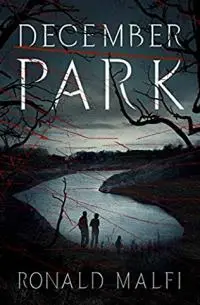 Ronald Malfi is best known for his novels December Park and Little Girls, as they are the kind of stories that creep up on readers and induce a terror that is truly haunting.
Ronald Malfi is best known for his novels December Park and Little Girls, as they are the kind of stories that creep up on readers and induce a terror that is truly haunting.
Ronald: “Can you recommend a book that’s really scary?” It’s the question I hear often from fans of the genre, or see posted with unmatched frequency on message boards and in Facebook groups. “What’s the scariest book you’ve ever read?” “What book caused you to scream in fright?” People post questions like these, and I appreciate where they come from, even if I have some difficulty understanding them. I mean, have you ever jumped out of your skin while reading a particular passage? In such a context, scaring is tantamount to startling someone. A jump scare, really.
Look, I’m a 43-year-old dude with two kids, high cholesterol, and a collection of facemasks dangling from a pegboard next to my front door. Real-life scares me; books don’t. That’s just a fact. How can I say such a thing, you might ask, since I earn my keep on this pale blue dot penning horror fiction? It’s simple: books don’t scare me...but the right book will create a palpable, disquieting sense of dread that, when done well, will linger in my thoughts long after I’ve finished reading. To me, that’s a successful horror novel. You might suggest that I’m splitting hairs, but I’m not. Enter the notion of “quiet horror.”
For me, quiet horror is less about gore and monsters and bloodletting, and more about the suffocating, inescapable sense of dread that tightens around your throat like a noose with each page that you read. It’s when an author favors atmosphere over that clunky square peg known as plot; when an author recognizes that it’s more effective to make you uncomfortable than to scare you with copious amounts of blood. It’s all about the atmosphere, created by the right language, and thrust upon realistic, memorable characters. It’s about being slowly suffocated by language. It’s why they’re called horror books and not scary books. It’s the author’s ability to plant a seemingly innocuous little seed in your gray matter, that over time, the more you contemplate the story, that seed sprouts into a poisonous thing with snakelike roots and flytrap buds, draining you of a good night’s sleep with each passing second.
Get December Park at Bookshop or Amazon
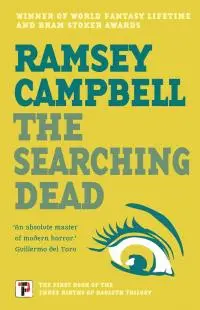 Ramsey Campbell is a living legend in the world of horror fiction and has been delivering fresh literary nightmares to readers for decades. He continues this terrifying onslaught in his recent works, The Searching Dead and Somebody's Voice.
Ramsey Campbell is a living legend in the world of horror fiction and has been delivering fresh literary nightmares to readers for decades. He continues this terrifying onslaught in his recent works, The Searching Dead and Somebody's Voice.
Ramsey: I’d like to start by trying to define the term, and I’m inclined to do so quite narrowly. I don’t think it’s the same as restrained horror. Those are qualities for which M. R. James is rightly celebrated, but is his horror strictly quiet? I’d argue that a face being sucked off the bones (in “Count Magnus”) or someone’s teeth smashed by a mouthful of gravel (“A Warning to the Curious”) is full-on horror, however reticent the presentation.
So who and what represents quiet horror? Certainly Shirley Jackson in almost all her tales of terror, and Robert Aickman in the delicate strangeness of most of his. There’s the insidious insinuation of Arthur Machen’s “The White People”, told entirely by indirection and the more disturbing for it. The uncanniness of Walter de la Mare’s tales can sometimes be so quiet as to border on inaudible. Alison Moore’s “Eastmouth” is a gem of the form, as is Marghanita Laski’s “The Tower”. Charles L. Grant appears to have invented the term to define his Shadows anthologies, and his own work epitomises it as well as anyone’s. Many of Dennis Etchison’s stories fit the bill and he cited Hemingway as an influence on his spare style. I’ll suggest that Hemingway’s “The Killers” is a crime story whose very quietness conveys helpless terror. If I were going to be supremely finicky I might suggest that while Jackson’s Haunting of Hill House is a milestone of quiet terror, the Robert Wise film doesn’t quite line up, since it makes so much of an issue of its reticence (unlike most of the horror films produced by Val Lewton, which are stylistically subtler). Charlie Grant was kind enough to use several tales of mine in the Shadows series, and I’ll take his word for it that they belonged.
Get The Searching Dead at Bookshop or Amazon

About the author
Andrew Robert, "The Book Dad", is a voracious reader and reviewer of horror fiction. He is the curator of a promotional platform called Horror Oasis and the owner of DarkLit Press.








